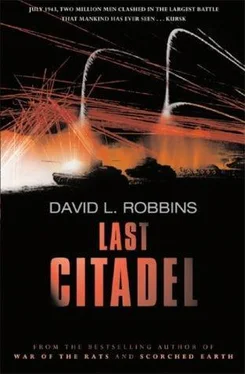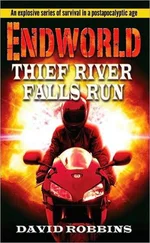Luis stopped. He turned a full circle on the rails and tingled. He’d walked into the place where he would have set the snare were he the one lying in ambush. A curve in the tracks. A band of trees on both sides of the rails. Wide fields behind them, no villages close by. Luis cast his gaze into the brush and branches left and right, and peopled the dark with twenty-five dirty faces per side, breaths held, fifty fingers on triggers. He walked another dozen quiet steps, sensing the Russians’ anger; in the darkness he pitched his own wrath against theirs, and in the spark that was made when the two met and struck, he saw the explosive.
He froze on the track. The train was far back and puffing, waiting for his signal to come forward. The partisans would be waiting just ahead, expecting the train’s momentum to carry it past the point of the tracks they intended to blast, toppling the cars in front of them. Perhaps they haven’t heard the train yet; Luis himself could barely make out the huffing locomotive.
He hoped they hadn’t seen or heard him, either.
He bent low, approaching the mine with five careful strides. Wedged sideways between the tracks was a fat log, like a damsel tied there in the night. Luis knelt beside it, feeling the bark, listening into the darkness for the sound of boots coming to draw a knife across his scrawny neck. With exploring fingers, he determined the nature of the bomb. Jammed between one end of the wooden trunk and the left-hand rail were two bars of C-3 explosive, two and a quarter pounds of the stuff smashed between the wood and the steel. Luis skimmed fingers across the putty lumps of plastique, feeling for the blasting caps; there would be two, wired together in case one failed. He found them and pulled his hand away; blasting caps were notoriously volatile, far more than the C-3 itself.
Luis admired the cleverness of the partisans. The section of tree trunk had been laid between the tracks as tamping for the explosive. When the C-3 blew, only one track would be severed, the one on the inside of the curve. This rail would break to the side, not up. The tram cars leaning around the bend in the tracks would derail to the inside of the curve, and because one set of wheels would be lower, the cars would spill over.
Luis saw the single electric cord running to the blasting caps. The slender wire ran left, straight into the trees in front of him. This was not good. The partisans were right there, forty meters away. Slowly, he put his Luger pistol in the hand holding the flashlight, and reached his empty hand into a tunic pocket for his wire cutters.
He dropped the Luger.
The thing clattered, metal tattle-tale on the big granite stones of the rail mound. Luis wasted not a second. He clutched the wire cutter and snipped the wire, felt the wire coil away from the blasting caps, then pulled the caps out of the C-3 as quickly as he dared. Once the explosive was disarmed – the detonators were out in seconds but to Luis it seemed an hour – he jumped to his feet and took this new physique of his on its first flat-out run.
He turned on the flashlight and blinked it three times into the darkness that swallowed the train. This was a different signal. Then he threw the flashlight away and drove his arms and legs as fast as he could. It was good to hear his boots were not always so silent; this time they tore down the rail ties with blaring purpose.
The first shots sounded in the trees. He could not tell how close the bullets came to him, he was running and huffing so hard he would have to get hit by a bullet before he would know if they had a bead on him. He ran down off the rail ties into the grass; it made no sense to race straight down the tracks, it made him too easy a target. More reports cracked out of the trees on both sides. Luis reproached himself for a clumsy ass, dropping the pistol like that. He ran on, exhilarated, laughing with manic gasps at every shot fired behind him that missed; he was too thin to be much of a target.
The waist-high grass beside the rail mound did not slow him. Like running on the moon, he thought, pumping his knees and elbows; whipped-up pollen flew in his face, a night breeze brushed his puffing cheeks. But what speed, he thought, where is the gravity of the world now?
He lost count of the shots the partisans fired at him. He wasn’t worried about being wounded, they never got a clear look at him in his speeding black uniform. He just wanted to get back to the train fast, before the partisans could repair the cut wire and blow the track anyway, settling for that little victory and making their escape. Luis had more planned for them.
The soldier shined his flashlight at Luis coming up out of the grass. Luis stopped and turned back up the tracks. He controlled his breathing as best he could to be quiet, to hear if they were still shooting or even following. He heard nothing.
From the other direction came the train, rushing to where they stood. This soldier had done his job. When Luis flashed him three times, he was to summon the train.
‘Captain, are you alright?’ the soldier asked.
‘Yes,’ Luis huffed. ‘They… uh…’ he took a deep breath and blew it out, ‘…they spotted me. But I found it. I cut the wire…’
‘Are they following you, sir?’
‘I don’t know.’
The soldier unshouldered his submachine-gun.
‘You go back to the train, Captain. I’ll keep them off you.’
Luis took one more moment to look this boy over, the Czech one who’d delivered the message to his compartment an hour ago. This is why the SS is running out of men, Luis thought.
‘No, Private. Stay with me. You’ll get your chance in another minute.’
The train rumbled up to them. The two ran alongside. Luis climbed onto the ladder to the locomotive. He stuck his head into the compartment. ‘Keep this speed, no faster,’ he shouted to the engineer. Then he dropped off the ladder and let the train haul the first of the passenger cars to him. He beckoned the Czech grenadier to follow, then matched the pace of the car and jumped aboard.
He entered the car. Fifty SS troopers huddled in the seats; helmets, boots, belts, and barrels creaked and rattled with the joggling of the slow-moving train. Several of the soldiers snored.
‘Up,’ Luis said. A few leaped to their feet; the jangling noise animated the rest.
‘Now,’ Luis said.
In seconds the men lined up like paratroopers in an airplane to leap from the passenger car doors. Luis turned to enter the next car.
‘Up,’ he said.
When he had done this in all four cars, issuing two hundred trained grenadiers onto the rail mound, he jumped down the tracks, the Czech soldier at his heels. The train engineer, though a fearful man, had not sped the train up one jot.
When his own passenger car rolled past, Luis saw the major peering out the open window of his own cabin.
Luis waved. ‘You’re going to miss the fun, Major.’
Grimm held up both palms to Luis and shouted down, ‘Wait!’ He disappeared from the window. Luis envisioned the fat officer scrambling in his dark compartment for his socks and boots to scoot off the train before it reached the partisans and their booby-trap.
The train ambled by. When the flatbeds carrying the Tigers came up, he called to the guards on the first car: ‘Ready’
Two of the guards jumped from the flatbed over to the connected car, which was covered by a tarp. With Luis and the Czech private watching, the guards slipped the ropes holding the canvas sheath. The tarp flapped in the moving wind and fell away from a sandbagged machine-gun position. The two guards leaped in behind the gun, primed the ammo belt in the breech, and slid by toward the partisans, pivoting the barrel left and right, ready just as Luis had commanded and planned. When the last car in the train rattled by carrying the second tarp-covered pillbox, Luis gave the same signal. The soldiers sprang to their assignment.
Читать дальше












